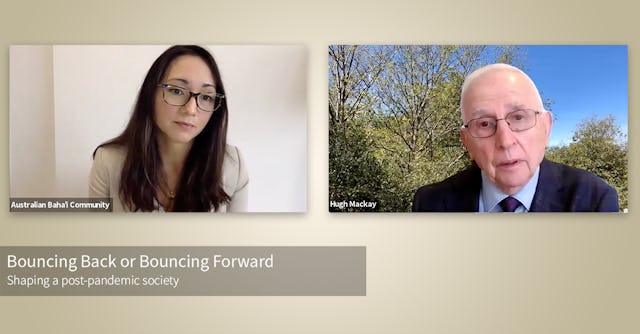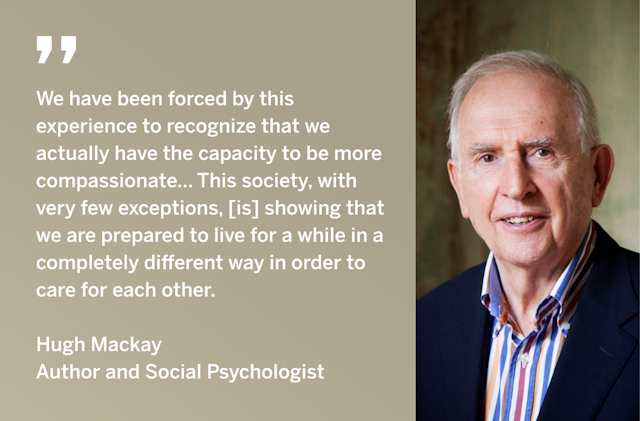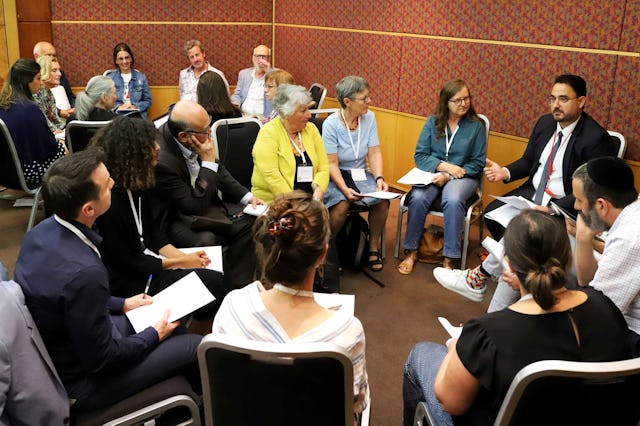Conversations on social cohesion gather momentum in Australia since pandemic
SYDNEY — Since the pandemic began conversations on racial and economic disparities, conceptions of ‘us’ and ‘them’, and lack of participation in decision-making processes have gained prominence in Australia. These and other issues were explored in an online seminar held last week by the Australian Baha’i Office of External Affairs as part of its efforts to contribute to the public discourse on social cohesion.
“Although this crisis has exposed more inequalities and prejudiced attitudes, it has also spurred a movement toward seeing ourselves more as a family,” says Ida Walker of the Office of External Affairs. “If we were to see that one member of a family had to suffer for another to prosper, we would readily acknowledge the imbalance. We need to see all of society in a similar way.”
In the online seminar titled “Bouncing Back or Bouncing Forward?” Ms. Walker discussed with Hugh Mackay, a prominent Australian author and social psychologist, how their society could reconsider its notions of identity, prosperity, and economic life in order to address social divides.
“We have been forced by this experience to recognize that we actually have the capacity to be more compassionate,” said Mr. Mackay. “This society, with very few exceptions, [is] showing that we are prepared to live for a while in a completely different way in order to care for each other. And I think that is a very promising sign.”
Mr. Mackay also observed that reduced mobility in light of the crisis has led to a return of neighborhood life and has allowed people residing in the same apartment building or street to see each other as part of one community. “These are not people we chose to live with, but they are people who carry this peculiar human status of ‘neighbor’. … And the key to the health of any society is that citizens act like neighbors.”
The online seminar, which drew 250 participants, was held as part of the Australian Baha’i community’s efforts to advance a conversation on social cohesion through a series of roundtables. Participants in the seminar included officials, civil society organizations, journalists, academics, and representatives of faith communities, many of whom expressed how the ideas discussed would inform their own contributions to diverse fields, including government policy.
In reflecting on the seminar and past roundtables, Ms. Walker says: “Our aim with these discussions is to contribute to building consensus on issues of national concern among the many sections of society.
“By applying the principle of Baha’i consultation we have found that a space is created where diverse perspectives are harmonized and points of unity are amplified. For example, each person offers their perspective without being attached to it, allowing everyone to explore it. Selflessness, love and cordiality are what is needed to reach consensus and unity of action.”
Through these discussions, the Baha’i Office of External Affairs is bringing together various perspectives in a document that seeks to convey an inclusive vision about social cohesion in Australia. This document will be presented to government and civil society organizations later this year.
“The fullest expression of any spiritual conviction can only be found in action. We need spaces at all levels, especially in neighborhoods, where people can consult to better understand one another and seek solutions to issues facing our society. Consultation provides opportunity to create greater cohesion by allowing people to draw on spiritual principles, diverse perspectives, and positive values from their cultures.”


